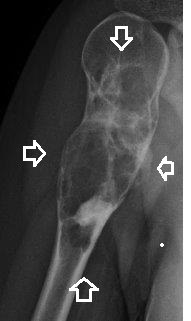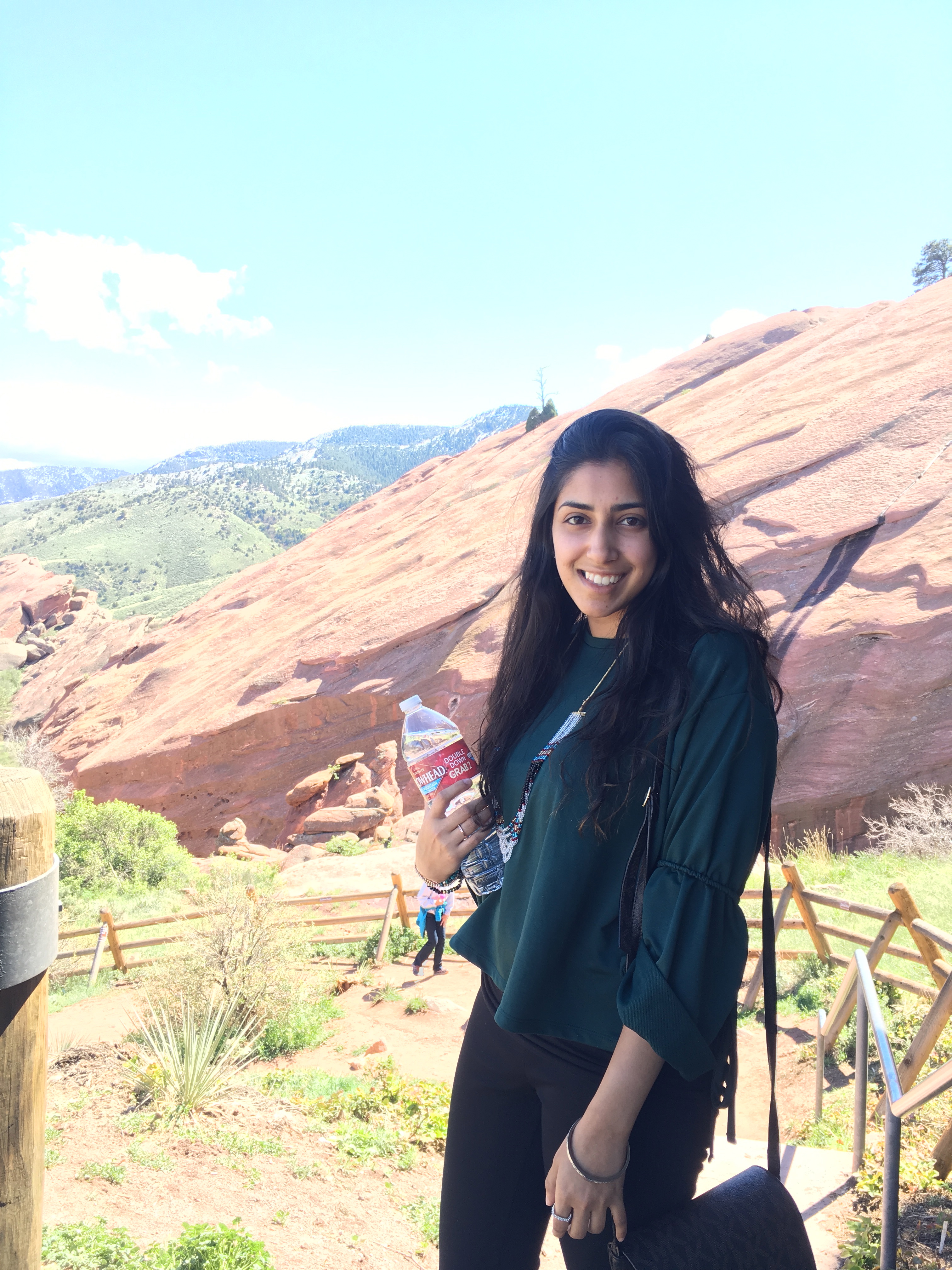Case of the Month – Pediatric Benign Bone Tumors — There is “a light at the end of the tunnel.”
Benign bone tumors in children are quite common. In fact, much more common than other well-known pediatric “diseases,” such as scoliosis or club feet. Approximately 500 children in Houston suffer a benign bone tumor per year, or approximately one child for every ten childhood fractures. Pediatric Malignant Bone Tumors average about 30 patients a year in Houston, an incidence of approximately five out of one million. Who is on the front line of this battle? Caring and committed moms, dads, pediatricians and pediatric sarcoma specialists.
The diagnosis of a “simple” bone cyst is not so “simple.” It is as common as many pediatric fractures, and can be very disabling. Benign bone tumors in children are more common than other common pediatric diseases, such as scoliosis or club feet. Approximately 500 children in Houston will suffer a benign bone tumor per year, or approximately one child for every ten childhood fractures.
Fractures associated with benign tumors are not only relatively common but have a high risk of recurrence and lengthy recovery. When that occurs, a child’s recovery can occupy several years of limited activities.
I will feature patient case studies in this Blog and Ayesha Masood is a perfect fit to be the first Patient Case of the Month because she has a common problem and her treatment unfortunately extended over many years. Ayesha’s high school athletic career ended because of the multiple fractures through a benign bone cyst in her shoulder, and ultimately her recurrent fractures jeopardized her ability to attend college classes because of multiple recurrences of her cyst and multiple painful fractures. Her most recent surgical treatment for a large six-inch bone cyst in the humerus was successful and has given her new hope for a full recovery. Her recovery from her most recent surgery is almost complete and she is excited about her recent accomplishment of graduating college. After her arm heals, she looks forward to helping with children’s soccer leagues. She has recently taken a huge leap toward a pain-free quality of life and fulfilling her dream to pursue a career in healthcare.
When dealing with any type of pediatric bone tumor, it is important to have an opinion from a skilled surgeon who is experienced with the treatment of pediatric bone tumors.
If your child has a benign bone tumor, with a fracture, consider getting a second opinion about your treatment options because these tumors have a high risk of recurrence, thus preventing your child’s full recovery.
Ayesha’s story:
“I loved playing soccer in high school.
All of that ended when I was 16 because of a fracture in my arm through a benign non-cancerous bone cyst in my right humerus, near my shoulder.
My orthopedic doctor didn’t recommend doing anything because of my young age and thought I would grow out of it. At age 17 I broke my arm for the third time in the same place. I had surgery at age 18 to remove the cyst and artificial bone was placed inside my arm but the cyst and fractures recurred.

Ayesha’s Cyst pre-surgery
As a young teen, I didn’t understand what this problem meant for me or that it could recur over multiple times. Stopping to play soccer was a harsh reality and experiencing five to six different fractures was also hard to understand.
This experience convinced me that I wanted a career in healthcare. My physician’s assistant helped me emotionally move past this overwhelming time of repeat fractures and helped me take my first steps to recovery.
I enthusiastically began my studies at the University of Houston, majoring in kinesiology, with an emphasis on orthopedics. I also enjoy being a research assistant at Baylor College of Medicine, focusing on mental health.
In June 2017, pain in my right arm became worse, radiating to my shoulder. Before I could get it checked, I tripped up the stairs and fractured my arm again, and the pain now interfered with my college academic work.
I connected with Dr. Conrad through a mutual friend and I was aware of the great reputation of the orthopedic/oncology program at the McGovern Medical School at The University of Texas Health Science Center at Houston.
I knew I was in good hands because Dr. Conrad specializes in the diagnosis and treatment of bone tumors in children and adults. He immediately determined that my bone cyst needed surgical treatment and I needed to have surgery again.
Dr. Conrad operated and removed the bone cyst in July 2017. I knew he had extensive experience with a regional tissue bank so I was relieved that I could receive a bone graft from a tissue bank, rather than synthetic bone or bone from me.
Dr. Conrad has been amazing; he is very committed to making sure the treatment and the recovery were discussed and on target. Because he is so approachable and discusses all of the treatment aspects with me, it made this experience much better. And my surgical procedure was the turning point in the healing of my shoulder and my recovery and return to school.
I graduated from the University of Houston in 2018 and my goal is to become a practicing physician’s assistant with a master of science in public health.
I want to give back to neighborhoods, where I see the need, and I want to do what I can to make things better, through public health.

Ayesha Masood at the Red Rocks in Denver, CO.
With my bone cyst finally gone, I am excited to have a fresh start in life, and to begin a new healthier chapter. The recurring bone fractures lasted for six years and limited my life and how I viewed myself. Throughout that challenge, I was fortunate to have tremendous support from my family and close friends.
I am proud of my tumor scar because it represents something I overcame and my last surgery was the best thing I could have done. Now I am finally getting better.
If I meet anyone dealing with a similar issue, I will tell them to find expert medical care, focus on the next step and to get strong emotionally and physically. Don’t focus on why it happened; focus on how you can move forward.
Even though I sacrificed my high school soccer career, I didn’t focus on the why, and I chose to be a referee so that I was still involved with the game.
Moving forward, I plan to continue to turn my past experiences into a positive outcome for me.
There are problems like mine that affect many young people who are not given the information and resources that I was so fortunate to receive.
I want to help them see the light at the end of the tunnel.”
###
***
Ernest “Chappie” Conrad, M.D., is Professor, Department of Orthopaedic Surgery, specializing in orthopedic oncology, at McGovern Medical School at The University of Texas Health Science Center at Houston (UTHealth).
A graduate of Washington and Lee University, Dr. Conrad completed medical school at The University of Virginia School of Medicine in Charlottesville, Virginia. He did his internship at Roosevelt Hospital in New York, New York, and his residency in orthopedic surgery at The Hospital for Special Surgery Sloan-Kettering Memorial Hospital Cornell Medical Center New York, New York. His fellowship in orthopedic oncology was under Dr. William Enneking at the University of Florida and an additional fellowship in pediatric orthopedics was completed under Dr. Mercer Rang at the Hospital for Sick Children in Toronto, Ontario.
After completing his fellowship in Toronto, Dr. Conrad joined the University of Washington School of Medicine and Seattle Children’s Hospital in Seattle, where
he pioneered the surgical treatment of sarcoma, as well as set the standards in assessing risk and response in sarcoma patients using Positron Emission Tomography (PET). His pioneering work in limb salvage surgery and novel treatment protocols continues.
Dr. Conrad’s research interests include the imaging of sarcomas, the clinical and biologic description of hereditary multiple exostoses, and the documentation of adequate tumor surgical margins for sarcoma surgical resections.
Disclaimer- The treatment and clinical comments as well as statements made in the course of this Sarcoma Blog are intended for general information and not for specific patient recommendations and represents the clinical opinion of Dr Ernest U. Conrad and does not represent Memorial Hermann Hospital, Children’s Memorial Hermann Hospital, The UT Health care system or McGovern Medical School. If you would like specific advice regarding your personal health care, please contact the Orthopaedic Oncology Clinic at UT Health at 713 486 5956 or your local healthcare provider.